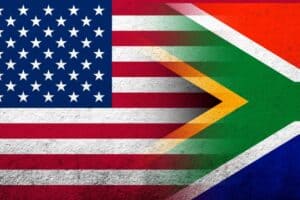While the 30% tariff is a tough pill to swallow, South Africa must stop reacting to global trade shocks and start preparing for them.

The decision by US President Donald Trump to impose a 30% tariff on certain South African imports is more than a trade technicality – it’s a blow to an already fragile economic relationship.
For many South Africans, especially those in agriculture, manufacturing and mining, this move feels like a punch to the gut.
But while the tariff hike – which takes effect on 1 August – is a setback, it should also serve as a wake-up call for South Africa to reassess its global trade strategy and take decisive, calculated action.
Let’s be clear: the US is within its rights to protect its industries, but the rationale behind this tariff is not clear.
Some say it’s about trade imbalances; others suggest it’s tied to South Africa’s non-aligned stance on global conflicts, especially the Russia-Ukraine war, as well as its affiliation with the BricsPlus bloc.
Others say this action is less about trade and more about a show of power by the Trump administration.
Whatever the reason, the implications are real. Jobs are on the line, exports are at risk and investor confidence is under pressure.
In practical terms, South African goods entering the US market are now significantly more expensive.
That citrus farmer in Limpopo or the steel manufacturer in Gauteng suddenly find themselves priced out of a crucial market.
ALSO READ: Where Trump’s tariffs will hurt most
For a country with already high unemployment and limited fiscal space, this couldn’t have come at a worse time.
But despair is not a strategy. South Africa has options – and it must act fast.
The global reality is that the aggressive US tariff policy is creating a fragmented world trading system that further elevates economic uncertainty.
While there is a great deal of fear psychology about just now, South Africa is not without remedies.
First, Pretoria must reopen immediate diplomatic channels with Washington. This is not the time for pride or passive commentary.
South Africa must make the case that it remains a vital, responsible economic partner and deserves reconsideration or at least clarification.
As a small open economy, it remains essential that bilateral negotiations must continue to stabilise and consolidate future US-SA investment and trade relations.
Second, the government should not hesitate to take the matter to the World Trade Organisation if the tariffs appear to violate established trade norms.
We can’t let precedent be set without challenge. Third, this is a golden opportunity to double down on the African Continental Free Trade Area.
By boosting trade within Africa, South Africa can reduce its dependence on volatile external partners.
ALSO READ: Wait-and-see to Trump’s hardline
Why fight for crumbs at someone else’s table when we can help set our own? We also need to diversify aggressively.
Our overreliance on Western markets, especially the US, leaves South Africa vulnerable.
South Africa should strengthen ties with Europe, Asia, the Middle East and fellow Brics countries.
New trade deals, expanded market access and regional value chains must become central to our economic diplomacy.
Lastly, government support is essential. Industries directly hit by the tariff hike must not be left to weather the storm alone.
Targeted relief, export incentives and skills development programmes can cushion the blow and maintain momentum.
Collaboration between government and the private sector to accelerate the identification of alternative markets must continue.
The 30% tariff is a tough pill to swallow, but it also offers a moment of clarity. South Africa must stop reacting to global trade shocks and start preparing for them.
In doing so, we can turn a trade crisis into a turning point for a smarter, more resilient economic future.
NOW READ: Ramaphosa disputes Trump’s 30% tariff claim as ‘not accurate’
Support Local Journalism
Add The Citizen as a Preferred Source on Google and follow us on Google News to see more of our trusted reporting in Google News and Top Stories.








